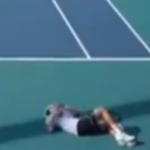Dream of playing collegiate tennis, but you are a high school student? Recruiting for college tennis can be exhilarating and daunting at once. Given the abundance of gifted athletes available, you could be asking, “What do I need to do to stand out?” Thankfully, you can bring your goal to life with the correct plan and technique. The key actions to assist you negotiate the college tennis recruitment process and maximize your prospects of landing a seat on a collegiate team will be broken out in this article. Let’s present some successful strategies.

Appreciating the College Tennis Recruiting System
Understanding the collegiate tennis recruiting process is the first step in being hired. Every level—Division I, Division II, Division III, NAIA, and NJCAA—has criteria and expectations; college tennis recruitment is quite competitive. More than simply ability is sought for by coaches; they also want players that complement the academic standards and culture of their program. Coaches carefully assess not only a player’s skills but also how well they fit into the team’s environment and the school’s academic standards. However, balancing intense training schedules with academic responsibilities can be overwhelming for many athletes. Managing college subjects and assignments alongside rigorous practice sessions often leaves little time to focus on studies. This is where online help becomes a valuable asset. Trusted paper resources, including top-rated writers, can step in to support student-athletes in meeting their academic demands and AssignmentBro provides tailored assistance to help athletes keep up with their coursework without compromising their training. By using these resources, student-athletes can focus on excelling in their sport while ensuring they stay on track with their academic goals. Understanding how to balance these dual roles effectively will allow players to navigate the recruiting process with greater ease and confidence.
Building a Strong Tennis Profile
College coaches will be drawn to you only if you have a solid tennis profile. Consider your profile as your sports resume; it should highlight your abilities, successes, and distinctive playing qualities. Here are some main elements to consider:
- Show your UTR (Universal Tennis Rating), national and state rankings, and notable match wins. Consistent performance against tough opponents is what coaches want.
- Educational Performance: More than you would believe, your class rank, SAT/ACT scores, and GPA count. Many collegiate coaches search for student-athletes able to balance their education with their sport.
- Highlights from videos: Make a top-notch film combining practice drills and match play. Show several angles, your court movement, and pressure point handling technique.
Establishing a strong profile can help you stand out from others since it facilitates Coach evaluation of your potential. Update your profile often to show fresh successes and gaming improvement.
Building a Game Plan: Events, Rankings, and Exposure
Getting noticed in the realm of college tennis requires participation in the appropriate events. To search for possible recruits, coaches frequently go to regional, national, and sometimes worldwide events Here’s how you may maximize your tournament involvement:
- Choose Events Wisely: Emphasize events like USTA events and ITF junior tournaments that college coaches value. These gatherings draw more scouts and offer greater exposure.
- Recognize your ranking system. College coaches’ assessment of your level of performance depends critically on your UTR and national ranks. Participating in events scheduled to award the most points can help you to raise your ranks.
- Boost Your Reversibility: If you cannot make every significant tournament, think about live-streaming your events or distributing highlight reels on social media and using recruiting sites like NCSA or tennisRecruiting.net.
Strategically choosing where you compete will help you stand out to more coaches and raise your chances of being recruited.
How to Communicate with College Coaches Effectively
The hiring process depends critically on communication. This is your opportunity to demonstrate the coach you are actually interested in their program and create a personal relationship. Here’s how to handle this important phase:
Making a Good First Impression
Throughout the hiring process, first impressions count a great deal. Always personalize your message while dealing with coaches. First look at the school’s tennis program and then discuss particular reasons you would like to play on their team. Given hundreds of emails coaches get, a generic message won’t be sufficient.
What to Include in Emails and Calls
As you get in touch with coaches, be sure to mention the following:
- Your name, year of graduation, high school, and present tennis ranking in brief.
- Your GPA, SAT/ACT results, and any academic honors define you.
- Tennis Success: Important wins, rankings, and competitions you have competed in.
- Video Link: To your highlight reel or match footage.
- Questions to the Coach: Show your interest by carefully probing the team’s dynamics, training schedule, and scholarship program policies.
Always follow up on your first meeting with updates on your development or forthcoming events. Consistency keeps you on the coach’s radar and indicates your seriousness about the opportunity.
Navigating the NCAA Rules and Guidelines for Tennis Recruitment
The recruitment process depends on a knowledge of the guidelines the NCAA sets. Different divisions have different policies on when and how coaches might get in touch with you. This is what you should know:
- NCAA Division I and II: Following June 15 of the sophomore year, coaches can begin contacting candidates. They can answer your emails before that but cannot get in touch initially.
- Division III and NAIA have less rules, which gives coaches more freedom in getting in touch with players.
- Official Visits: You are permitted to visit Division I schools up to five times officially and unlimitedly visit Division II and III institutions. These trips will help you to obtain a sense of the university, meet the team, and find whether the surroundings live up to your expectations.
Maintaining knowledge of the regulations will enable you to prevent possible rule infractions compromising your eligibility.
Conclusion
Recruitment for college tennis calls for commitment, planning, and a clear awareness of the procedure. Achieving your goal requires developing a good tennis profile, competing in appropriate events, and keeping open lines of contact with coaches. Recall that coaches want people who would be a good match for their team and school environment, not only outstanding athletes. maintain focused, be proactive, and maintain improving your academics as well as your game. Using the correct strategy will help you to be one step closer to realizing your ambitions about collegiate tennis. Good luck!





